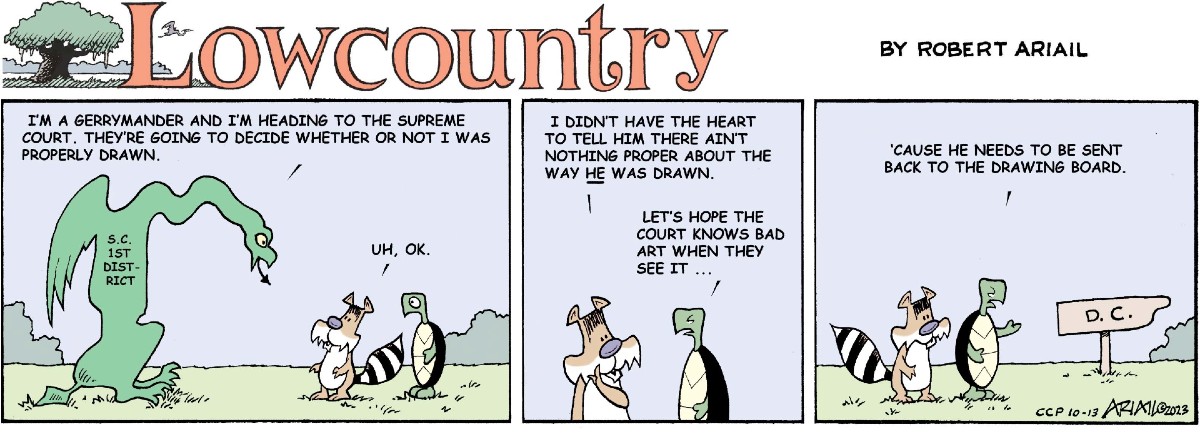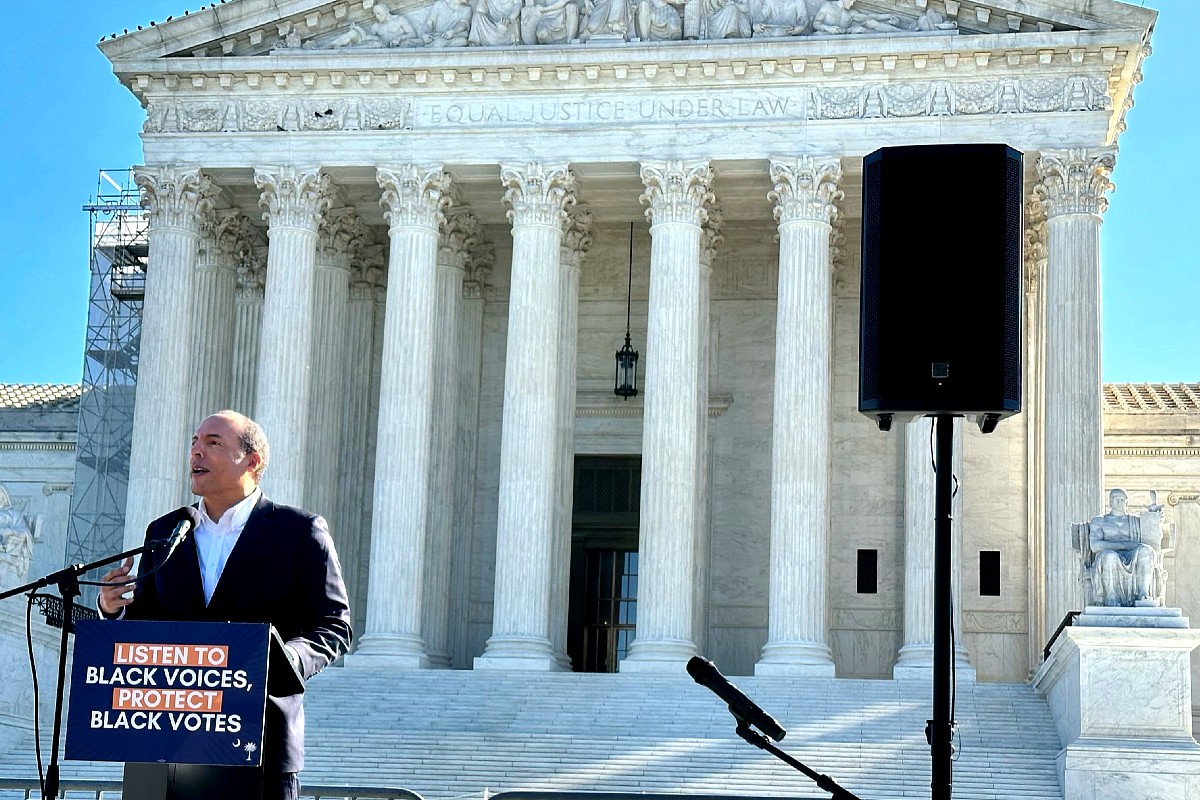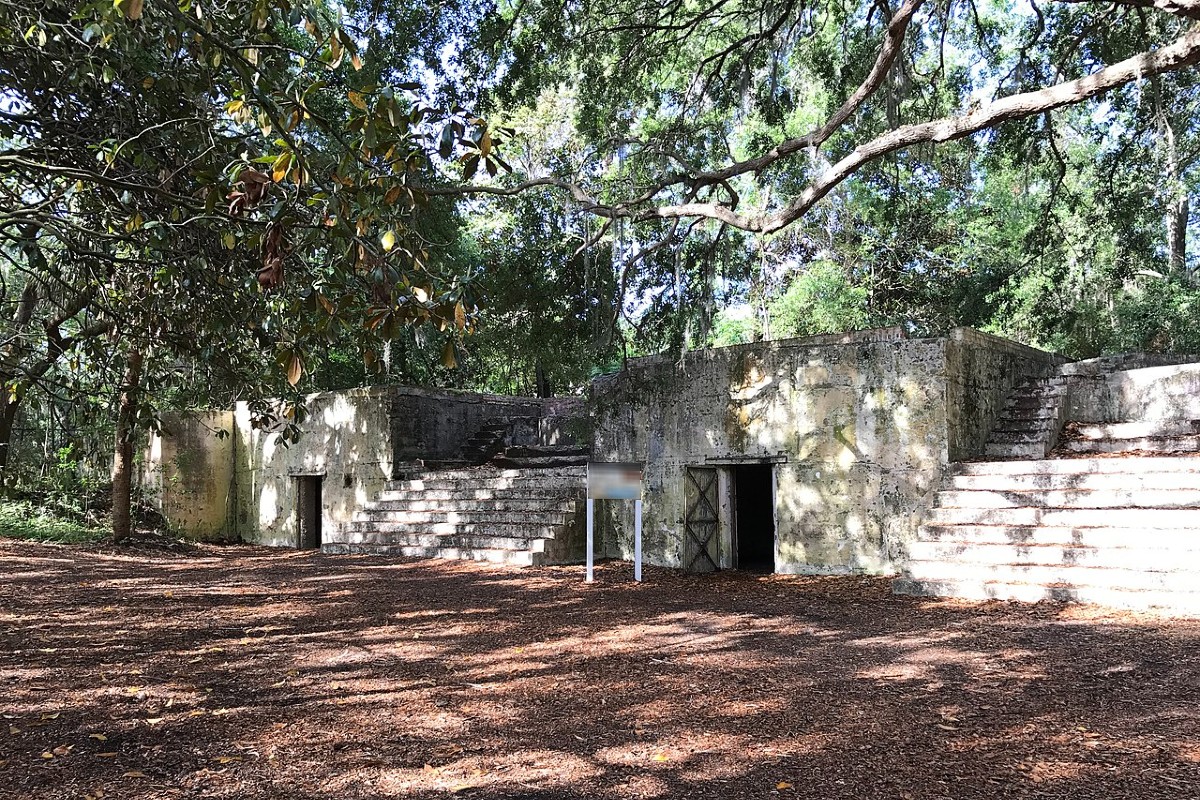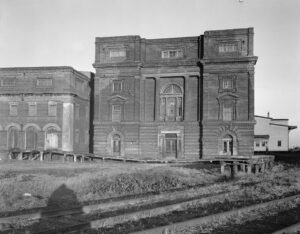STATEHOUSE REPORT | ISSUE 22.41 | Oct. 13, 2023
NEWS BRIEFS: Harris urges S.C. students to vote while at CofC
LOWCOUNTRY, Ariail: Back to the drawing board?
COMMENTARY, Brack: Let’s hope the fix isn’t in on the First Congressional District
SPOTLIGHT: Charleston Animal Society
MYSTERY PHOTO: In the jungle
FEEDBACK: More accountability needed
NOTE: Today’s issue is briefer than usual due to travel.
Harris urges S.C. students to vote while at CofC

Staff reports | Vice President Kamala Harris on Wednesday encouraged students to vote in powerful numbers as she promoted their importance in the coming 2024 election during her appearance at the College of Charleston.
![]() “Right now, in South Carolina we are looking at a situation where state legislators basically passed a law that would try to dilute the Black vote in the state,” the vice president said. “It is wrong that any elected official would try to choose who can vote for them, when it should be the voter who chooses who represents them.”
“Right now, in South Carolina we are looking at a situation where state legislators basically passed a law that would try to dilute the Black vote in the state,” the vice president said. “It is wrong that any elected official would try to choose who can vote for them, when it should be the voter who chooses who represents them.”
The Wednesday visit was part of Harris’s “Fight For Our Freedoms” tour in which she makes stops at colleges and universities across the country to connect with young people ahead of the 2024 election. Young voters were a critical coalition for Harris and President Joe Biden in 2020 as they won 61% of voters between the ages of 18 and 29, according to AP VoteCast.
During the event at the College of Charleston’s Sottile Theatre, Harris addressed several topics, including reproductive freedom, gun safety, climate action and LGBTQ+ equality.
“You have been confronted with issues that many generations before you haven’t seen,” she said. “You all have only known a climate crisis. You all have only known active shooter drills. You all became aware of injustices when you witnessed what happened to George Floyd.
She also addressed a looming U.S. Supreme Court over a South Carolina case involving alleged racial gerrymandering (see below).
“You all, in your lifetime, just witnessed the highest court in our land take a constitutional right that had been recognized such that many of you will know fewer rights than your mother or grandmother.”
In other South Carolina News:
U.S. Supreme Court may restore voting map ruled a racial gerrymandering. In a South Carolina case before the U.S. Supreme Court involving gerrymandering, race and partisanship, justices signaled they may restore a map from redistricting that continues to favor Republicans in the First Congressional District. A panel of lower court judges ruled the map unconstitutional.
U.S. Justice Department awards millions to enhance services for crime victims. The Department of Justice is awarding more than $4.4 billion in grants to support community safety across the U.S., centered around reducing violence and crime.
Biden administration sending $997M to S.C. from bipartisan infrastructure law. The U.S. Department of Transportation’s Federal Highway Administration has allocated $997 million to South Carolina for 12 formula programs to support investment in critical infrastructure, including roads, bridges and tunnels, carbon emission reduction, and safety improvements, as well as workforce development to support these investments.
S.C. school report cards show academic gains, but rising violence. South Carolina schools improved in almost every major academic subject last school year, according to the state report cards released Oct. 10. But more students are fighting and missing class than in recent years.
Corrections department believes it has to fix illegal cellphones in S.C. prisons. Law enforcement connects a multitude of crimes, ranging from drug trafficking to attempted murder to a deadly prison riot, with a common thread: South Carolina inmates getting their hands on cellphones behind bars.
S.C. nuclear plant gets warning over cracked emergency fuel pipe. Small cracks have been found a half-dozen times in the past 20 years in pipes that carry fuel to emergency generators at the V.C. Summer plant near Columbia, leading federal officials to issue warnings over substantial safety violations.
The money behind the Charleston school board. It didn’t cost that much for conservatives to take over the Charleston County school board, as donations to the five candidates in the freshly elected Moms For Liberty-backed majority raised $127,444.94, according to an analysis of campaign disclosure reports on file with the S.C. State Ethics Commission.
Back to the drawing board?

Award-winning cartoonist Robert Ariail generally has a biting or funny comment about the great state of South Carolina in his weekly cartoon. This week, Ariail takes up the gerrymandered First Congressional District and the case being appealed to the U.S. Supreme Court. Love the cartoon? Hate it? What do you think: feedback@statehousereport.com.
Let’s hope fix isn’t in on 1st Congressional District

By Andy Brack | The way that U.S. Supreme Court justices posed questions Wednesday about whether the First Congressional District in South Carolina was unconstitutionally gerrymandered makes it look like the fix is in. They may be poised to side with arguments that how South Carolina legislators jiggered district lines was OK.
 But what our state’s elected Republican leaders did was not right. Mapmakers redrawing district lines to account for population 2020 shifts actually moved 30,000 Black voters out of the First District. That effort essentially “bleached” the district by dramatically boosting the percentage of White voters. Because Blacks historically vote overwhelmingly for Democrats, the not-so-subtle reapportionment exercise gave incumbent U.S. Rep. Nancy Mace, R-S.C., a much safer Republican district – one that will be harder for her to lose because of the very way the map is drawn.
But what our state’s elected Republican leaders did was not right. Mapmakers redrawing district lines to account for population 2020 shifts actually moved 30,000 Black voters out of the First District. That effort essentially “bleached” the district by dramatically boosting the percentage of White voters. Because Blacks historically vote overwhelmingly for Democrats, the not-so-subtle reapportionment exercise gave incumbent U.S. Rep. Nancy Mace, R-S.C., a much safer Republican district – one that will be harder for her to lose because of the very way the map is drawn.
In 2020, she squeaked out her first win using old map lines. But in 2022 with the new redder (and whiter) map, she won by 14%.
The issue, however, isn’t black and white, apparently, for some justices.
“Disentangling race and politics in a situation like this is very, very difficult,” Chief Justice John Roberts said Wednesday in questions to lawyers during oral arguments about the South Carolina case.
Umm, judge. Focus on this number: 30,000. It ain’t too hard to see how moving 30,000 Black voters sounds like a pretty good tip of the hat for race, not politics, being the deciding factor in that map – a map that a panel of three lower court federal judges found to be unconstitutional.
The Supreme Court, which in June struck down a gerrymandered map in Alabama for diluting Black voting power, doesn’t appear to be on that same track with the South Carolina case. That may be because the arguments in the Alabama case focused on a federal civil rights law, while key issues in the South Carolina case are found in the equal protection clause of the U.S. Constitution, according to The New York Times. “The two can tug in opposite directions,” the Times report noted.
While the court signaled Wednesday that it might lean toward reversing the lower court’s decision on the unconstitutionality of the First District, let’s hope a little common sense will prevail.
Michael B. Moore, a Black Democrat who is running against Mace in 2024, took a podium outside the U.S. Supreme Court on Wednesday to remind justices about a similar situation seven score years ago involving his great-great- grandfather, Civil War hero Robert Smalls.
After the war, “Robert Smalls went on to serve five terms in the U.S. Congress,” Moore said in a story he often tells on the stump. “But in 1884, his district was gerrymandered by extreme politicians who sought to mute his influence and silence the voices of those he represented.
“Sound familiar? Now, in 2023, I find myself here on the steps of the Supreme Court, fervently advocating for the voting rights of roughly 30,000 Lowcountry residents — many of whom are almost certainly descended from the same constituents that Robert Smalls served.”
Moore said today’s voters who were in the First District have been deprived of their voice in Congress.
“Their voting power has been significantly diluted. And their rightful impact on our democracy has been unconstitutionally diminished,” he said. “While 1884 may seem like a long time ago, the same cynical tactic endures in 2023: marginalizing one bloc of voters to benefit another, and maintaining unearned political power by whatever means necessary.”
You’d think we could do better today. Dum spiro spero. While I breathe, I hope.
Andy Brack is editor and publisher of Statehouse Report and the Charleston City Paper. Have a comment? Send to: feedback@statehousereport.com.
Charleston Animal Society
 We’re pleased today to shine our spotlight on the Charleston Animal Society, leader in the effort to make Charleston County a safe place for animals. Now the society is working to expand its Charleston success statewide to energize the state to reshape its 300-plus shelters and animal organizations into a no-kill network that stretches from Walhalla to Little River to Daufuskie Island.
We’re pleased today to shine our spotlight on the Charleston Animal Society, leader in the effort to make Charleston County a safe place for animals. Now the society is working to expand its Charleston success statewide to energize the state to reshape its 300-plus shelters and animal organizations into a no-kill network that stretches from Walhalla to Little River to Daufuskie Island.
Safe and healthy communities, neighborhoods and families don’t just happen – they’re built. “No Kill – No Harm – No More” shines a spotlight on animal abuse and family violence, which are often perceived and treated as separate issues. However, animal abuse is often the tip of the iceberg to larger issues in the home, such as child abuse, elder abuse or domestic violence.
- South Carolina’s most honored charity four years in a row
- National model for success
- Southeast’s only AAHA-accredited combined clinic and shelter
- Focused on solving problems rather than reacting to them year after year
- Publishes Carolina Tails, the largest pet magazine in S.C.
- No Kill. No Harm. No More. is a “movement” comprised of two major initiatives: No Kill Charleston and No Kill South Carolina.
- Learn more about the Charleston Animal Society and its work to create a network of humane network for the animals that bring joy to our lives.
In the jungle

Here’s a structure located in what appears to be a South Carolina jungle. What is it? Where is it? Send us your guess of what this photo shows – as well as your name and hometown – to feedback@statehousereport.com.
 Last week’s mystery photo, “This one might surprise you,” showed an old Library of Congress photo from the 1930s of Bennett’s Rice Mill, 19 Concord St., in Charleston. These days, only the facade survives in the middle of a big port parking lot where South Carolina-made BMWs are exported all over the world.
Last week’s mystery photo, “This one might surprise you,” showed an old Library of Congress photo from the 1930s of Bennett’s Rice Mill, 19 Concord St., in Charleston. These days, only the facade survives in the middle of a big port parking lot where South Carolina-made BMWs are exported all over the world.
Allan Peel of San Antonio, Texas, shared some of the mill’s early history: “he building was constructed in 1844 by Thomas Bennett Jr. (1781 – 1865), a S.C. banker and owner of three thriving plantations who also served as the 48th S.C. governor between 1820 and 1822. Operations at the mill began in 1845, employing the latest steam-powered technologies to separate rice grains from their husks. Originally 90-feet by 60-feet in size, Bennett’s Mill was only the third largest rice mill in Charleston in terms of its physical size. Yet given its waterfront location and the efficiencies of its modern steam technologies, Bennett’s Mill produced some 200 bushels a day by 1850, making it the third most productive rice mill in America.”
David Lupo of Mount Pleasant shared that “the building was used in the early 20th century by the Planters Peanut and Chocolate Company. After that, ownership passed to the railroad and, in 1958, to the S.C. Ports Authority.”
Congratulations to all of the sleuths who also identified the photo: George Graf of Palmyra, Va.; Jay Altman and Elizabeth Jones, both of Columbia; Jacie Godfrey and Amy Johnson, both of Florence; Hope Williams of Varnville; Charles Ford and Jasper Solt, both of Charleston; Pat Keadle of Wagener; Jannie Stewart of Georgetown; Albert Jacobs of Ridgeville; Carla Nelson of Manning; Bill Segars of Hartsville; Frank Bouknight of Summerville; and Cheryl Benson-Schoettner.
>> Send us a mystery picture. If you have a photo that you believe will stump readers, send it along (but make sure to tell us what it is because it may stump us too!) Send to: feedback@statehousereport.com and mark it as a photo submission. Thanks.
More accountability needed
To the editor:
![]() The following is a response to the article, BIG STORY: S.C.’s maternal health in rapid decline, experts say, posted on Sept. 22, 2023:
The following is a response to the article, BIG STORY: S.C.’s maternal health in rapid decline, experts say, posted on Sept. 22, 2023:
As described in the book, For the Love of Maddie, there are many people who secure a career in public service who are not servants. This book details one of many experiences in which an African American woman endures the painstaking consequences of avoidable medical mishaps. There are some medical professionals working with little to no accountability for the people they are there to serve. I think it is a travesty that as a society police officers and teachers have come to understand they will have to justify their behaviors while medical professionals have little or no accountability for a lot of the decisions they purposefully make when their personal biases towards others impact the lives of so many people.
The significance of this problem is that interacting with police officers, teachers and medical professionals over the course of a life is unavoidable. However, the public servant in the medical profession who goes unaddressed impacts the lives of so many people regardless of whether a child enters the world as a healthy human being or not. If we are going to make our state one that values the life of an unborn child, we should hold medical professionals accountable for making every effort to ensure that the unborn child is born. However, there is little to no accountability for medical professionals who oversee the child-birthing process, especially if a woman is educated and melanated.
– Robyn Mixon, Charleston, S.C.
Send us your thoughts
We encourage you to send in your thoughts about policy and politics impacting South Carolina. We’ve gotten some letters in the last few weeks – some positive, others nasty. We print non-defamatory comments, but unless you provide your contact information – name and hometown, plus a phone number used only by us for verification – we can’t publish your thoughts.
- Have a comment? Send your letters or comments to: feedback@statehousereport.com. Make sure to provide your contact details (name, hometown and phone number for verification. Letters are limited to 150 words.
- ORDER NOW: Copies are in Lowcountry-area bookstores now, but if you can’t swing by, you can order a copy online today.
- Now available as an e-book!
ABOUT STATEHOUSE REPORT
Statehouse Report, founded in 2001 as a weekly legislative forecast that informs readers about what is going to happen in South Carolina politics and policy, is provided to you at no charge every Friday.
- Editor and publisher: Andy Brack, 843.670.3996
Donate today
We’re proud to offer Statehouse Report for free. For more than a dozen years, we’ve been the go-to place for insightful independent policy and political news and views in the Palmetto State. And we love it as much as you do.
But now, we can use your help. If you’ve been thinking of contributing to Statehouse Report over the years, now would be a great time to contribute as we deal with the crisis. In advance, thank you.
Buy the book
Now you can get a copy of editor and publisher Andy Brack’s We Can Do Better, South Carolina! ($14.99) as a paperback or as a Kindle book ($7.99). . The book of essays offers incisive commentaries by editor and publisher Andy Brack on the American South, the common good, vexing problems for the Palmetto State and interesting South Carolina leaders.
More
- Mailing address: Send inquiries by mail to: P.O. Box 21942, Charleston, SC 29413
- Subscriptions are free: Click to subscribe.
- We hope you’ll keep receiving the great news and information from Statehouse Report, but if you need to unsubscribe, go to the bottom of the weekly email issue and follow the instructions.
- Read our sister publication: Charleston City Paper (every Friday in print; Every day online)
- © 2023, Statehouse Report, a publication of City Paper Publishing, LLC. All rights reserved.















 We Can Do Better, South Carolina!
We Can Do Better, South Carolina!